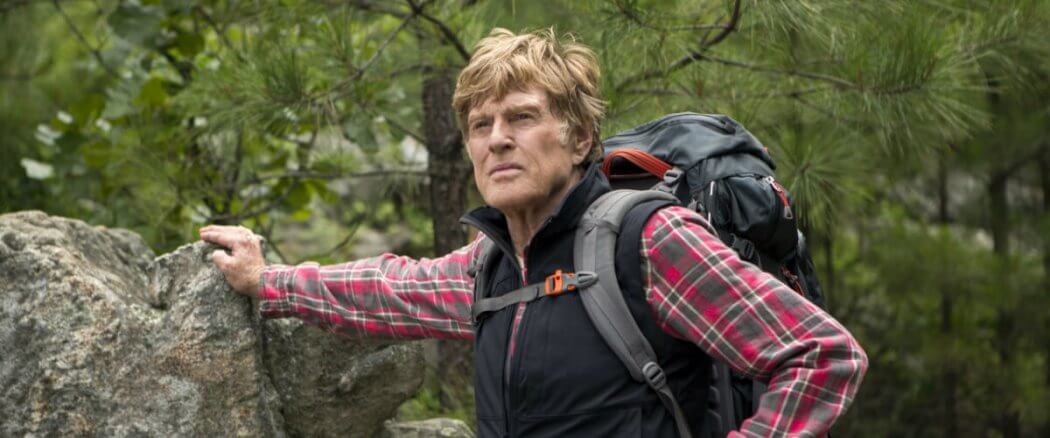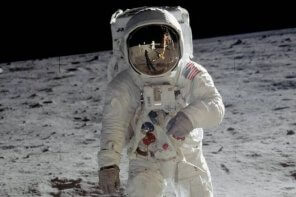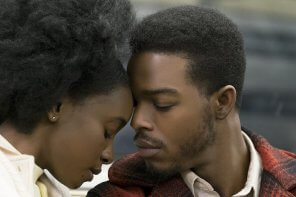Two of my wife and my best friends are inveterate hikers/backpackers. Despite being our age (that is, old), hardly a day goes by without their taking a several mile walk in the country, and often off-road. Of course, they live in the back country of Virginia’s mountains which makes these travels more accessible. Still, their major vacation most summers is a 1-2 week canoe and portage test of survival (not in their minds but in ours) into the Boundary Waters Canoe Area Wilderness in the very north tip of Minnesota. When we visit them, they condescend to shorten their trips and “make the way easy.” Barb and I so admire them (but not quite enough to take on their addiction).
So it was with interest that we found ourselves in Traverse City, Michigan for our last anniversary (as we often do – not roughing it but sampling the area’s vineyards, theaters and restaurants). The movie A Walk in the Woods was showing at the Bijou, the tiny art-house theater near the beach. We had read of the book of the same name, written by noted humorist and travel writer Bill Bryson, on which the film was based (quotes from here on out, unless otherwise identified, are from Bryson’s book which I have since read and so enjoyed). We watched A Walk… that one time at the Bijou and then again saw it with our friends from Virginia (who loved it) and have seen it again since. As a couple who do not generally seek out comedies, we consider A Walk in the Woods to be an overlooked gem.
Discovering an Obsession
As the movie opens, Bill Bryson (in real life at that time 44 years old but played by a crevassed, still ruggedly handsome 79 year old Robert Redford) returns to the USA from living abroad nearly 20 years. He has taken a leave from writing (he thinks) and settles into a small town in New Hampshire with his English spouse (played by the always delightful Emma Thompson) and children. He discovers that just beyond his back yard is a segment of the Appalachian Trail (our Virginia friends who live in Appalachia tell us it is correctly pronounced by the indigenous “like latching a gate” — Ap-uh-lach-ee-uh — despite what Merriam-Webster says).
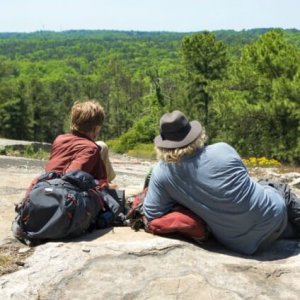 The Appalachian Trail stretches in one (more or less) continuous serpentine pathway for more than 2100 miles along fourteen of America’s eastern states from Georgia to Maine. It is “the granddaddy of long hikes”… very long. As Bryson writes in his book, “A little voice in my head said: ‘Sounds neat! Let’s do it.’” Knowing next to nothing about hiking of any type other than the polite English hikes where one would stop for tea and crumpets half way through a pleasant day-trip while outfitted in fashionable Oxford gear with a “haversack,” his friends and family thought him, in the words of his wife, “daft and an utter fool.”
The Appalachian Trail stretches in one (more or less) continuous serpentine pathway for more than 2100 miles along fourteen of America’s eastern states from Georgia to Maine. It is “the granddaddy of long hikes”… very long. As Bryson writes in his book, “A little voice in my head said: ‘Sounds neat! Let’s do it.’” Knowing next to nothing about hiking of any type other than the polite English hikes where one would stop for tea and crumpets half way through a pleasant day-trip while outfitted in fashionable Oxford gear with a “haversack,” his friends and family thought him, in the words of his wife, “daft and an utter fool.”
But his lack of any practical knowledge about carrying a 40 or 50 lb back pack over rugged terrain, and his lack of concern about his ignorance, allowed me to immediately identify with Bryson’s character. Never mind that the full trail takes at least 5 months and 5 million steps, and less than 10% of those who start out endure the travail – many quitting in tears within the first week or two. Never mind the physical pounding your body takes from carrying the necessities of life on your back. Never mind sleeping on the ground, either freezing in the high country early and late in the journey or suffering days of drenching rain and steaming heat in the summer months. Never mind swarms of mosquitoes, black flies, and other unpleasant insects. As Bryson writes, quoting the naturalist John Muir, sometime in your life you must answer the urge to “throw a loaf of bread and a pound of tea in an old sack and jump over the back fence.”
Problems
He was immediately assailed by a number of discouragements, such as his wife laying out gruesomely detailed stories of Appalachian Trail hikers who had been mauled and “gnawed pulpy” by Volkswagen-sized bears, poisoned by “in-your-sleeping-bag” copperheads, or murdered by “unknown-and-still-out-there” human predators. Not to speak of hikers who were vaporized by lightning, crushed beneath falling trees, or swept off a precipice by sheets of torrential rain. Despite some alarm and anxiety, Bryson was determined to go.
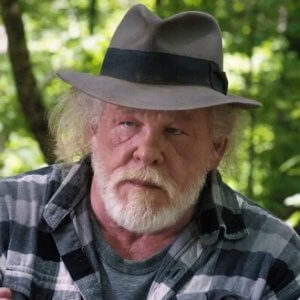 Bryson agrees to the sensibleness of his wife’s mandate that he would not be allowed to take this journey solo (and she certainly was not going), so there existed the problem of finding someone who would accompany him on his journey of a lifetime. Friend after friend, much to his spouse’s smug satisfaction, declined in incredulous wonder at his invitation — many with statements such as (from the movie) “next time call for something fun… like a colonoscopy.” After several months of racking his brain trying to think of anyone who would be a hiking companion, a “friend,” Stephen Katz, called him having heard from mutual acquaintances that he was looking for a hiking companion. Katz went to high school with Bryson in Des Moines, Iowa, but he had communicated with him less than a handful of times since an ill-fated trip they took among the hostels of Europe ended badly with both of them “despising each other.”
Bryson agrees to the sensibleness of his wife’s mandate that he would not be allowed to take this journey solo (and she certainly was not going), so there existed the problem of finding someone who would accompany him on his journey of a lifetime. Friend after friend, much to his spouse’s smug satisfaction, declined in incredulous wonder at his invitation — many with statements such as (from the movie) “next time call for something fun… like a colonoscopy.” After several months of racking his brain trying to think of anyone who would be a hiking companion, a “friend,” Stephen Katz, called him having heard from mutual acquaintances that he was looking for a hiking companion. Katz went to high school with Bryson in Des Moines, Iowa, but he had communicated with him less than a handful of times since an ill-fated trip they took among the hostels of Europe ended badly with both of them “despising each other.”
Thus enters Nick Nolte as Stephen Katz in a role, at least at this stage of his life, for which he was born. Very doubtful about the wisdom of including Katz, Bryson becomes certain it was a mistake when Katz flies to New Hampshire and Bryson first lays eyes on him. “He had always been kind of fleshy, but now he brought to mind Orson Welles after a very bad night.” As Katz deplaned from the small aircraft on which he had flown in and, wheezing and coughing, staggered towards Bryson, his wife turned to him with a brief self-satisfied smile followed by “a look of serene blankness.”
And They’re Off
But off they go, with adventures both hilarious and touching. It is a “buddy” movie with an occasional lapse into poor sexist ribaldry. As they (Katz much more than Bryson) are talking about some of their most macho moments in high school, justice prevails by their falling (figuratively and literally) into their most dire predicament. (None of the women with who saw this movie seemed offended by their objectification of various female body parts – pretty much high school humor stuff.) To make up for that, along the way the viewer is treated to some glorious cinematography of the Blue Ridge, Great Smoky, Cumberland, Green and White Mountains, and the Shenandoah Valley.
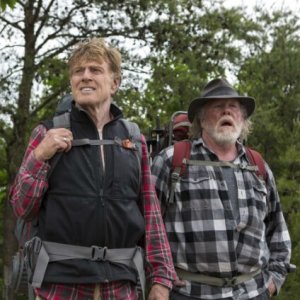 There are fellow travelers who you would pray to God they might be lost from you by the end of the day. This especially includes Mary Ellen (played as the ultimately annoying know-it-all by Kristen Schaal) and hikers who spend hours discussing the pros and cons of any particular piece of hiking equipment. Then there is a seductive temptation to forget your marriage vows (Jeannie, played coyly and vulnerably beckoning as seductresses are, by Mary Steenburgen), and a moment of truth regarding Katz’s alcoholism (“There’s just this hole in my life where drinking used to be.”) Plus a number of laugh-out-loud, spraying-your-drink-out-your-nose situations with rescues by their own ingenuity or the grace of a few strangers.
There are fellow travelers who you would pray to God they might be lost from you by the end of the day. This especially includes Mary Ellen (played as the ultimately annoying know-it-all by Kristen Schaal) and hikers who spend hours discussing the pros and cons of any particular piece of hiking equipment. Then there is a seductive temptation to forget your marriage vows (Jeannie, played coyly and vulnerably beckoning as seductresses are, by Mary Steenburgen), and a moment of truth regarding Katz’s alcoholism (“There’s just this hole in my life where drinking used to be.”) Plus a number of laugh-out-loud, spraying-your-drink-out-your-nose situations with rescues by their own ingenuity or the grace of a few strangers.
Were they successful? Well, far more than they had any right to believe they could be. But did they do the entire 2100+ miles (there is great debate about the exact length of the trail)? I will not divulge that, but there are some surprises along the way. As noted above only a very small number of those who set out to hike the entire length of the trail in one season (early spring to late fall) actually are successful. Most who hike the entire trail do so in segments over a period of two or more years. And, of course, the largest percentage never make the entire trip at all.
In addition to being a great pleasure just for its humor, the movie teaches (a dreadful word that shall not be uttered if you are taking your teens – the language makes it inappropriate for young children) about the steadily vanishing American wilderness and the feeble attempts of the US Forestry Service to prevent that from happening. It brings prominence to the fact that many species of trees are dying off with a depressing number already being extinct (the once grand American Chestnut forests, for example) – mostly due to the introduction of alien insects and diseases for which our American forests have no immunity. We have not been good stewards of the beautiful splendor that God gave us.
This Is What I Learned
And what could a Christian apply to their life from such a pleasant, smile-inducing movie? The aforementioned response of Bryson to real temptation? Yes. And Katz’s moment of confession to his alcoholism where he spoke words that, as someone who has treated addicts in that situation, rang very true. And to not fear what “might” happen, because almost everything we worry about will not. And when Bryson is in a predicament he believes he might not survive, he regrets that he has not told his wife how much he loves her, even if “she knows.” Yes, all of us can relate to that. Most of all that we should value our friendships and our loves; that we should experience the wonder of God’s world rather than be surrounded by our electronics and HVAC environment. Finally that we should laugh at ourselves and with others, as Bill Bryson can.
So enjoy this small film. Then take a walk with your dog, your child, your spouse, or a good buddy. Enjoy God’s creation and give thanks to God for it.
And if you enjoy the film a lot, consider reading the book on which it was based which is even more delightful and detailed regarding the fascinating history of the Appalachian Trail and the wildernesses of the Eastern United States. And also a little angrier about how our government has so often dropped the ball when trying to preserve our natural resources.
“Then God said ‘Look! I have given you every seed-bearing plant throughout the earth and all the fruit trees for your food. And I have given every green plant as food for all the wild animals, the birds in the sky, and the small animals that scurry along the ground – everything that has life.’ And that is what happened. Then God looked over all he had made, and he saw that it was very good!” Genesis 1:29-31

